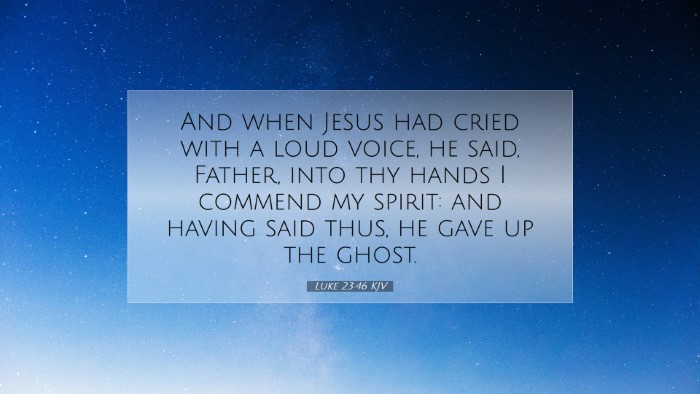Commentary on Luke 23:46
Luke 23:46 states: "And when Jesus had cried with a loud voice, he said, Father, into thy hands I commend my spirit: and having said thus, he gave up the ghost." This verse marks the culmination of the crucifixion, emphasizing both the humanity and divinity of Jesus. Below is a comprehensive commentary synthesizing insights from notable public domain commentators including Matthew Henry, Albert Barnes, and Adam Clarke.
Contextual Overview
This prayerful declaration occurs at the moment of Jesus’ death, symbolizing the completion of His earthly mission. The context is vital; Jesus was crucified after suffering immense physical and spiritual turmoil. This moment encapsulates profound theological significance, highlighting Jesus' relationship with the Father, His trust in God, and the accomplishment of redemption.
Theological Significance
Each of the commentators calls attention to the theological implications of Jesus' statement:
-
Matthew Henry:
Henry reflects on Jesus entrusting His spirit to the Father as an act of profound faith. He stresses that Jesus’ last words underscore His resolve in fulfilling the will of God, even unto death. It reveals a perfect trust in God's plan and purpose, a crucial lesson for believers regarding the value of steadfast faith in the face of adversity.
-
Albert Barnes:
Barnes emphasizes the fulfillment of prophecy and the totality of the sacrifice. He notes that Jesus’ cry was both a declaration of the completion of His mission and an acknowledgment of God’s sovereignty. By entrusting His spirit, Jesus sets an example for His followers to rely on God at life’s most critical moments.
-
Adam Clarke:
Clarke focuses on the specificity of Jesus addressing God as 'Father'. This indicates a deep, personal relationship that He maintained throughout His ministry. Clarke also draws attention to the use of the phrase 'commend my spirit', suggesting a voluntary relinquishment of His life, affirming that Jesus was not a victim of circumstances but willingly embraced His fate for humankind's salvation.
Spiritual Reflection
The cry enables believers to reflect on their own spiritual journeys. What does it mean to commit one’s spirit to God? The commentators provide insights on the practicality of this verse in their lives:
-
Matthew Henry:
Henry encourages believers to approach death with the same confidence Jesus exhibited. For him, this verse offers comfort, reinforcing the idea that when they face their end, they too can commit themselves to God, secure in His promise of eternal life.
-
Albert Barnes:
Barnes suggests that believers should adopt a posture of trust and surrender in all aspects of life, not merely at death. This act of commendation is reflective of a vital relationship with God, one that should permeate their daily existence rather than be reserved for life's final moments.
-
Adam Clarke:
Clarke notes that Jesus' action of commending His spirit can be paralleled with how believers should view their own lives. They are encouraged to recognize that each day is an opportunity to surrender to God’s will, fostering a life defined by faith, trust, and hope.
Practical Applications
This verse can inspire various practical applications in ministry, teaching, and personal devotion:
-
Encouraging Trust:
Pastors can use this verse to encourage congregants to place their trust in God amidst trials, fostering a deeper reliance on Him for strength and assurance.
-
Modeling Surrender:
In teaching, this passage serves as a model for how one might approach life and death: with openness, trust, and surrender. It can be a basis for sermons focused on discipleship and reliance on divine providence.
-
Personal Devotion:
For individual believers, reflecting upon this moment can enhance personal prayer practices, inviting them to consider how they might commend their own spirits in everyday challenges and decisions.
Conclusion
Luke 23:46 carries profound significance as the culminating expression of Jesus’ life and ministry. The commentators—Matthew Henry, Albert Barnes, and Adam Clarke—each provide valuable insights that enrich our understanding of this pivotal moment. In this cry, we find not only the assurance of Jesus’ completed work but also a timeless encouragement to trust and surrender ourselves into the hands of God, much like He did. Through the study of this verse, believers are called to embrace a deeper faith and trust in their relationship with the Father.


